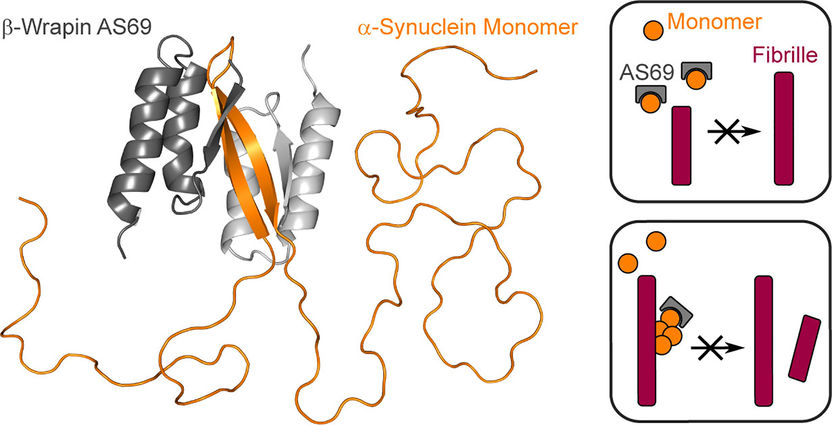Research into Parkinson’s disease: binding-protein prevents fibril proliferation

Aggregation inhibitor beta-wrapin AS69 (grey) binds a region in the otherwise disordered Parkinson’s protein alpha-synuclein (orange), preventing elongation and formation of new protein fibrils (red)
HHU / Wolfgang Hoyer
Protein aggregates have been observed in the nerve tissue of patients with Parkinson’s disease which consist of individual components (monomers) of the protein α-synuclein which assemble into what are referred to as amyloid fibrils. Similar deposits are also found in the case of other neurodegenerative diseases such as Alzheimer’s. Researchers are looking for approaches to prevent fibril formation and potentially cure the diseases.
In 2014, Düsseldorf-based researchers led by Prof. Dr. Wolfgang Hoyer described how a class of engineered binding-proteins, β-wrapins, are able to prevent α-synuclein aggregation. Hoyer says: “We subsequently investigated with research partners precisely how the β-wrapins function and where they disrupt the α-synuclein aggregation process.”
The collaborative group including first author of the study Emil D. Agerschou and Prof. Hoyer from the Chair of Physical Biology at HHU and the FZJ, Prof. Dr. Alexander Büll (Technical University of Denmark) and Prof. Dr. Björn Falkenburger (Technical University of Dresden) as well as other partners at the University of Cambridge and the German Center for Neurodegenerative Diseases in Bonn has now presented its findings in the journal eLife.
Firstly, the researchers found out that the β-wrapins prevent new α-synuclein monomers from elongating the amyloid fibrils. To do this, the β-wrapins capture the monomers and form chemical complexes with them.
But there is a further property that makes the β-wrapins particularly effective, as explained by Emil Agerschou: “The β-wrapins prevent seed fibrils from forming in the first place. It is especially relevant that very small amounts of the wrapins are sufficient for this to happen, so you don’t need a binding-protein for every monomer.” This is referred to as a ‘sub-stoichiometric effect’ that makes the process especially effective. It is the aforementioned complexes comprising binding-proteins and monomers that are responsible for inhibiting seed formation.
“We discovered a few years ago that α-synuclein fibrils can proliferate quickly under certain conditions in a kind of chain reaction. We were really astonished to see that the β-wrapins suppress the chain reactions very efficiently”, adds Prof. Büll: “We think we now understand how this is achieved.”
In addition, the researchers have examined the effect of the β-wrapins not only in test tubes but also in cell culture and in animal models. Diseased fruit flies (Drosophila) treated with β-wrapins displayed notably improved motor skills in a climbing assay.
Prof. Hoyer is still cautious about potential therapeutic use: “The positive results in living creatures give us hope that we have possibly found a path to an active ingredient through the β-wrapins. However, it will still be a long time before this could potentially be used for humans.”
Original publication
E. D. Agerschou, T. Saridaki, P. Flagmeier, C. Galvagnion, D. Komnig, L. Heid, V. Prasad, H. Shaykhalishahi, D. Willbold, C. M. Dobson, A. Voigt, B. H. Falkenburger, W. Hoyer, A. K. Buell; "An engineered monomer binding-protein for α-synuclein efficiently inhibits the proliferation of amyloid fibrils"; eLife; 2019;8:e46112
Original publication
E. D. Agerschou, T. Saridaki, P. Flagmeier, C. Galvagnion, D. Komnig, L. Heid, V. Prasad, H. Shaykhalishahi, D. Willbold, C. M. Dobson, A. Voigt, B. H. Falkenburger, W. Hoyer, A. K. Buell; "An engineered monomer binding-protein for α-synuclein efficiently inhibits the proliferation of amyloid fibrils"; eLife; 2019;8:e46112
Topics
Organizations
Other news from the department science

Get the life science industry in your inbox
By submitting this form you agree that LUMITOS AG will send you the newsletter(s) selected above by email. Your data will not be passed on to third parties. Your data will be stored and processed in accordance with our data protection regulations. LUMITOS may contact you by email for the purpose of advertising or market and opinion surveys. You can revoke your consent at any time without giving reasons to LUMITOS AG, Ernst-Augustin-Str. 2, 12489 Berlin, Germany or by e-mail at revoke@lumitos.com with effect for the future. In addition, each email contains a link to unsubscribe from the corresponding newsletter.
More news from our other portals
Last viewed contents
MorphoSys Appoints Head of Clinical Development
Novartis enters into agreement for exclusive US and Canadian rights to Fanapt, an FDA-approved oral therapy for schizophrenia

Distribution of COVID-19 vaccines with delivery drones - Wingcopter raises $22M to advance technology leadership in drone delivery, announces serial production
Intercell and GSK form strategic alliance to develop and commercialize innovative needle-free patch-based vaccines
Cancer drug prevents build-up of toxic brain protein

Oriola-KD Corporation - Espoo, Finland
Evonik to double its L-lysine capacities in the U.S. - First additional quantities expected in November 2011

Boosting PET recycling with higher standards for laboratory experiments - New study shows how enzymatic plastic degradation could be brought one step closer to commercialisation

New device quickly detects harmful bacteria in blood - Tiny device could help professionals diagnose and fight deadly infections






















































